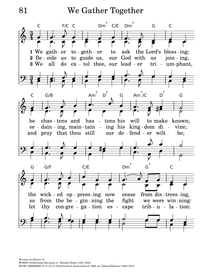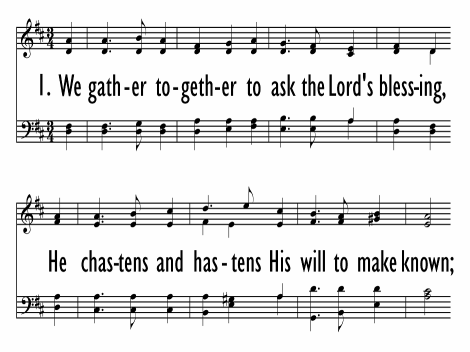- |
User Links
We Gather Together

We gather together to ask the Lord's blessing; He hastens and chastens His will to make known (Baker)
Translator: Theodore Baker; Author: Anonymous (1625)Tune: KREMSER
Published in 203 hymnals
Printable scores: PDF, MusicXMLAudio files: MIDI, Recording
Representative Text
1 We gather together to ask the Lord's blessing;
He chastens and hastens His will to make known;
the wicked oppressing now cease from distressing.
Sing praises to His name, He forgets not His own.
2 Beside us to guide us, our God with us joining,
ordaining, maintaining His kingdom divine;
so from the beginning the fight we were winning:
the Lord was at our side- the glory be Thine!
3 We all do extol Thee, Thou leader triumphant,
and pray that Thou still our defender wilt be.
Let Thy congregation escape tribulation;
Thy name be ever praised! O Lord, make us free!
Source: Psalms and Hymns to the Living God #193
Translator: Theodore Baker
Theodore Baker (b. New York, NY, 1851; d. Dresden, Germany, 1934). Baker is well known as the compiler of Baker's Biographical Dictionary of Musicians (first ed. 1900), the first major music reference work that included American composers. Baker studied music in Leipzig, Germany, and wrote a dissertation on the music of the Seneca people of New York State–one of the first studies of the music of American Indians. From 1892 until his retirement in 1926, Baker was a literary editor and translator for G. Schirmer, Inc., in New York City. In 1926, he returned to Germany. Psalter Hymnal Handbook, 1987 Go to person page >Author: Anonymous
In some hymnals, the editors noted that a hymn's author is unknown to them, and so this artificial "person" entry is used to reflect that fact. Obviously, the hymns attributed to "Author Unknown" "Unknown" or "Anonymous" could have been written by many people over a span of many centuries. Go to person page >Text Information
| First Line: | We gather together to ask the Lord's blessing; He hastens and chastens His will to make known (Baker) |
| Title: | We Gather Together |
| Dutch Title: | Wilt heden nu treden voor God den Herre |
| Author: | Anonymous (1625) |
| Translator: | Theodore Baker |
| Meter: | 12.11.12.11 |
| Source: | Netherlands Folk Song; Adrianus Valerius' Nederlandtsch Gedenckclanck, 1626 |
| Place of Origin: | Netherlands |
| Language: | English |
| Publication Date: | 1894 |
| Notes: | Spanish translations: See "Nos hemos reunido en el nombre de Cristo by J. R. de Balloch, "Nos hemos reunido en tu nombre oh Cristo" by J. Alfonso Lockward, "Venid nuestras voces alegres unamos" by Jose M. de Mora |
| Copyright: | Public Domain |
English
- [Shaʻare shirah] = Gates of Song : Music for Shabbat #165
- A Calendar of Hymns #d52
- A New Hymnal for Colleges and Schools #72
- A Treasury of Hymns: The best-loved hymns, carols, anthems, children's hymns, and gospel songs #27
- A. M. E. C. Hymnal #16
- African American Heritage Hymnal #342
- African Methodist Episcopal Church Hymnal #576
- Alleluia! Let Us Sing! #d10
- American Student Hymnal #d355
- At Worship: a hymnal for young churchmen #96 10 shown out of 146
Spanish
Tune
KREMSERThe tune KREMSER owes its origin to a sixteenth-century Dutch folk song "Ey, wilder den wilt." Later the tune was combined with the Dutch patriotic hymn 'Wilt heden nu treden" in Adrianus Valerius's Nederlandtsch Gedenckclanck [sic: Nederlandtsche Gedenckclank] published posthumously in 1626. 'Wilt…
For Leaders
Text:
The original Dutch text of this hymn, “Wilt heden nu treden,” was first published in 1626 by Adrian Valerius in his Nederlandtsch Gedenckclanck, though it may have been written earlier, in the late 16th century. The author is unknown. This text was written in celebration of the freedom of the Netherlands from Spanish rule. Theodore Baker, an American music scholar, translated the text into English in 1894 for an anthem titled “Prayer of Thanksgiving.”
When this hymn was first published in America, the idea of the United States' Manifest Destiny to overtake the American continent in God's name was still popular. The militant language and patriotic association can lend a sense of nationalism to the song that is inappropriate for a worship service. It may take some care to put this text in an appropriate context for worship. However, there are several phrases that may bring certain Scripture passages to mind (e.g., “the wicked oppressing,” Ps. 55:3; see also Scripture references below). When the hymn is put in this context, the message is clearly about the Church seeking God's help and thanking Him for His presence in the pursuit of victory over evil
Tune:
The tune now known as KREMSER is a Dutch folk tune, “Ey, wilder den wilt,” and is also from Valerius' Nederlandtsch Gedenckclanck (1626). It is the only tune to which “We Gather Together” is sung. Edward Kremser, a Viennese choirmaster, popularized this tune as part of a collection of Dutch folk songs arranged for male voices in 1877, and it has become known by his name. The original publication of Baker's text in 1894 was set to this tune. The tune is simple and well-known.
When/Why/How:
This hymn is traditionally associated with Thanksgiving Day in the United States, and could be used in a service for that occasion. It could also be used as an opening hymn for a service with the theme of the Church triumphant. If used for a choral prelude, Hal Hopson's arrangement of “We Gather Together” includes an instrumental descant throughout and a different melodic setting on the second verse.
A moderate tempo is appropriate, broadening in the third stanza to emphasize the exaltation of “thou leader triumphant.” Likewise, the accompaniment for the first two stanzas can be piano or organ alone, with other instruments entering on the third verse. “With Songs of Thanksgiving” is an arrangement by Douglas Wagner that includes a choral introduction and a trumpet descant on the third verse.
Tiffany Shomsky, Hymnary.org
Timeline
Arrangements
Media
The United Methodist Hymnal #131
- MIDI file from Baptist Hymnal 1991 #636
- MIDI file from Baptist Hymnal 1991 #636
- Audio recording from Baptist Hymnal 2008 #637
- MIDI file from The Cyber Hymnal #7191
- Audio recording from Glory to God: the Presbyterian Hymnal #336
- Audio recording from Small Church Music #299
- Audio recording from Trinity Hymnal (Rev. ed.) #363
- Audio recording from The Worshiping Church #376
- MIDI file from The United Methodist Hymnal #131
- Audio recording from The United Methodist Hymnal #131
- Audio recording from Worship and Rejoice #81
- MIDI file from Worship and Rejoice #81


 My Starred Hymns
My Starred Hymns







